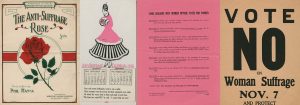By Rakashi Chand, Senior Library Assistant
Today is Women’s Equality Day, a day to commemorate the certification of the 19th Amendment to the Constitution, granting women the right to vote. The Amendment’s adoption was certified on 26 August 1920 by U.S. Secretary of State Bainbridge Colby: the result of a decades-long movement for women’s suffrage.
Amidst the backdrop of WWI and the Influenza pandemic of 1918-1919, American women were helping the war effort, caring for their families, and fighting for their rights. Today, we are again facing a global pandemic and the fight for social justice and equality is far from over. It feels as though this current mindset is bringing us closer to the minds and actions of our foremothers, transporting us through time.
For almost a century, organizations and diverse communities fought for equal rights across the nation. Yet even after the 19th amendment went into effect, the fight was not over for many, especially women of color. The literacy tests and violence that prevented black men from voting in the South kept black women from the polls until the Voting Rights Act of 1965. Other groups were also restricted. Native Americans gained some voting rights through the Indian Citizenship Act of 1924, while immigrants of Asian descent gained some voting rights when the Chinese Exclusion Act was repealed in 1943. It would not be until 1980 that male and female voter turnout would be equal. This serves as a timely reminder for us to wholeheartedly participate in the process of democracy and cast our votes in the election of 2020.
The battle for suffrage took the form of protests, picketing, hunger strikes, lectures, newspapers, pamphlets, and voices. The MHS holds many pro- and anti-suffrage items in its collection including prints, pamphlets, newspapers, personal accounts, and letters. I would like to share some of these items with you on this special anniversary.
To begin, some anti-suffrage items:

- The Anti Suffrage Rose, by Phil Hannah, published by the Woman’s Anti-suffrage Association, circa 1915
- Anti-Suffrage Calendar 1916, including pages for January and February
- Some Reasons Why Women Oppose Votes for Women, circular by the Women’s Anti-Suffrage Association of Massachusett
- Vote No on Woman Suffrage, circular
- The Massachusetts Association Opposed to the Further Extension of Suffrage to Women Records
And now, some pro-suffrage items:

- Women’s Suffrage, Engraving by Fredrikke S. Palmer
- Massachusetts Woman Suffrage Victory Parade; Instruction for Marchers
- Suffrage Parade, May 1914
This October, the MHS will host the 2020 Conrad E. Wright Research Conference, “Shall Not Be Denied”: The 15th and 19th Amendments at the Sesquicentennial and Centennial of Their Ratifications. This conference revisits the long journey to secure voting rights for African Americans and women in United States history. It considers the legal precedents and hurdles that each amendment faced, the meaning and uneven outcomes of each, the social context that allowed for ultimate ratification, the role of key individuals and groups in these respective contexts, and how each amendment has been remembered over time. Learn more and register at www.masshist.org/conferences.
Today we stay apart and stay at home to stop the spread of COVID-19, but let us all come together to honor the trail blazers who remind us that change is possible.

